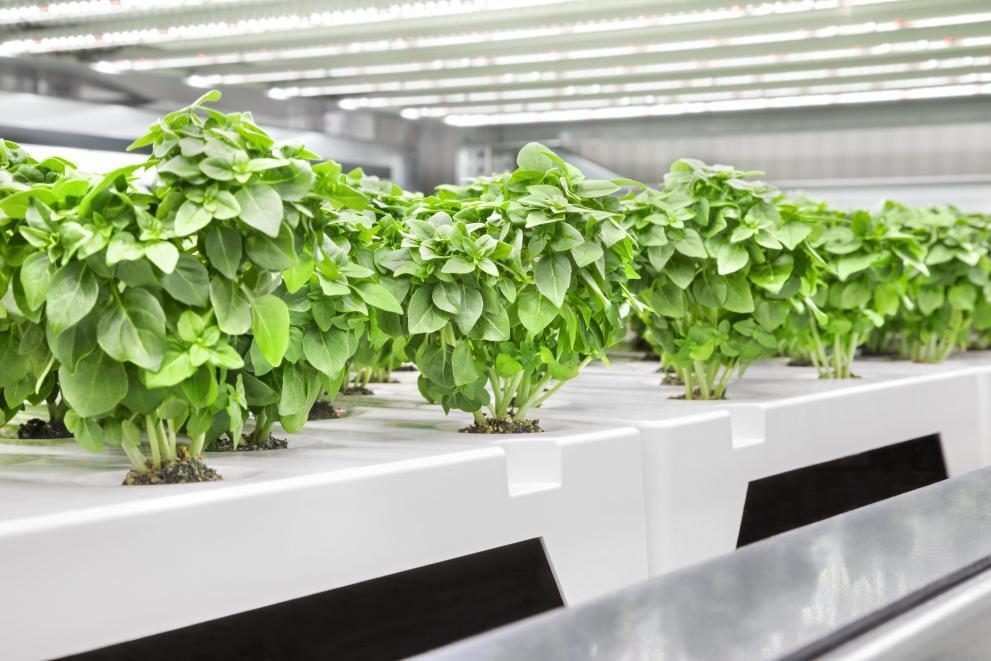
Urban agriculture is growing in popularity – from community gardens to edible rooftops. But the vision of some vertical farming companies goes beyond that – they want to transform our food systems to feed our planet more sustainably.
Imagine growing a year’s harvest of over 500 000 leafy greens, salads and herbs not on 10 000 square metres of farmland but stacked into just 40 square metres of floor space. This is exactly what’s happening at Infarm’s large-scale farming units around the world. The companies’ Growing Centres host a number of those modular units close to urban centres around the world. Infarm received close to €2 million from the European Innovation Council (EIC) pilot and recently raised $200 million in their Series D round.
By 2030, the company’s plans to expand its farming network to 20 countries, to deliver fresh, sustainable produce to consumers and help cities become self-sufficient in their food production.
In an interview, Sudhanshu Sarronwala, Chief Impact Officer at Infarm, talks about the roots of this remarkable company and its path to unicorn startup status.
What challenge is your company tackling?
There are three key challenges Infarm wants to help tackle.
The first one is making food production more sustainable. Global food production is to a high extent coupled with environmental harm - in fact it’s responsible for 31 % of total anthropogenic greenhouse gas emissions and a primary driver for biodiversity loss. Conventional agriculture practices also often deplete and contaminate vital resources, particularly nutrients and water. With Infarm, we want to deliver a sustainable solution for food production. We’re actually the first vertical farming company that has committed to a net-zero science-based target, which we will develop in line with the Greenhouse Gas (GHG) protocol and Science-Based Targets initiative (SBTi) requirements by the end of this year.
Secondly, we aim to reduce the reliance on lengthy, wasteful supply chains, which are prone to shocks and impact the availability and affordability of food. In standard supply chain practices, the food travels 2 500 km on average to reach the consumer and as much as one-third of food produced globally goes to waste. With Infarm, we want to change this by bringing our production closer to the consumer.
Finally, we aim to contribute to feeding the world. By 2050, 10 billion people will live on our planet, while the available farmland per capita is shrinking every year. As Ernst von Ende from the University of Wageningen put it: “The planet will need to produce more food in the next four decades than all farmers in history have harvested over the past 8 000 years.” We see vertical farming as one solution towards transforming the food systems in order to tackle this growing need for food.
Can you outline the key breakthrough technology Infarm developed to address these challenges?
With Infarm, we provide a way of farming that decouples food production from negative impacts on our ecosystems. Our farming units can produce the equivalent of a football field worth of crops on the footprint of the average living room – in a sustainable, safe and cost-effective way. In fact, we need 95% less land and 95% less water compared to traditional agriculture and use no chemical pesticides. Our modular approach to farming also allows us to grow various different crops under the same roof, all year round at the same quality, independently from weather and climate conditions. Lastly - we monitor our plants 24/7 with lab-grade sensors to ensure our products are not only safe but high in nutritional value, yield and quality.
Becoming a unicorn is the envy of all start-ups. How did your company make it?
The passion of our founders was a key driver in getting Infarm where we are today. From the very first day, they wanted the people and planet to benefit from the advantages of vertically farmed produce when scaled. We are also lucky to have a great network of investors and retail partners that believe in our purpose, and a large team of experts and crop scientists that are passionate about linking nature with innovative tech solutions.
Would you recommend EIC support to other startups, and why?
Absolutely. The support from EIC allowed us to experiment with significant upgrades to our hardware – ultimately contributing to increasing our production volume – and making improvements to our logistics network. The grant effectively provided valuable financial support at a significantly important time of R&D and business growth for us.
Interested to know more on how to scale-up with the EIC? Join us on 14 June online at the EIC Scale up 100 Info Day.
Details
- Publication date
- 23 May 2022